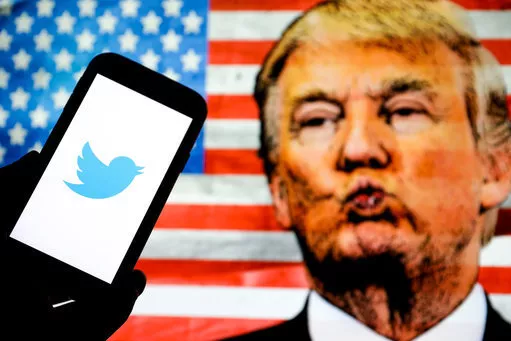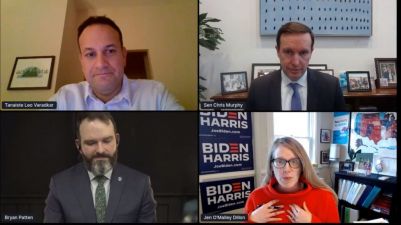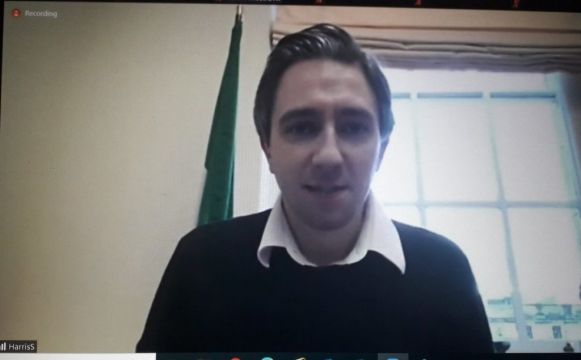Social media is more important than ever for Irish politicians and the importance of an online presence has only increased during the Covid-19 pandemic.
While a politician is now quite limited in terms of direct contact with constituents, there's no limit on Zoom clinics or video updates on Twitter and Facebook.
People can be reached like never before through social media, but getting the tone and message right is crucial, and political own goals are just as common on social media as successes.
Younger voters
Kirsty Park, the co-author of a DCU study into social media and the 2020 general election, and Green Party MEP Ciarán Cuffe spoke to BreakingNews.ie about Irish politicians and their use of social media.
The huge success of Sinn Féin in the general election came as a shock to some, but Ms Park points to the engagement they had in their social media campaign as a sign of what was to come.
Their success was primarily with younger voters and this was reflected in the reactions to their online presence ahead of the election.
“There's definitely an aspect of demographics when it comes to these things, and we know that younger people are more likely to use social media, so I think that definitely feeds into part of why they did so well.
“Some of their strategies also made sense in that they used a lot of populist indicators.... more so than the other parties so their messaging itself and the way that they were presenting themselves was connecting more with people.”
Engagement
“There's always been this idea that perhaps Sinn Féin voters are more active on social media, that may just be the case and it's not necessarily that Sinn Féin are doing a fantastic job engaging with them, although that may be part of it.
“It makes sense for any party these days to be taking social media seriously and seeing what they can do to engage. It's bigger than just putting lots of posts up or putting up lots of videos, a lot of it comes down to messaging.
“In the last election, Sinn Féin did a very good job of painting a narrative that they were the only real alternative to the status quo. They even penned Fianna Fáil into seeming like they were part of the government, so 'if you want to see change, you need to vote for us'.
“It's not just down to the tactics, it's also the messaging and the narrative that's accompanying those tactics.”
One insight Ms Park found was that posts by Sinn Féin in the buildup to the general election tended to have more positive reactions on Facebook. ‘Haha’, or ‘Angry’ constituted 94 per cent of emoji reactions for Fine Gael and 90 per cent for Fianna Fáil. In contrast, only 7 per cent of Sinn Féin’s emoji reactions were ‘Haha’ or ‘Angry’, with 91 per cent being ‘Love’.'
Narrative
Again, she attributes this to the type of narrative the party pushed in presenting itself as the main alternative to Fine Gael and Fianna Fáil.
“It points to that idea of who is setting the narrative and who is kind of winning when it comes to that. Those angry reactions were partly a reaction to the narrative Sinn Féin was pushing so when people had been exposed to the messages, what Sinn Féin were saying, when they saw a Fine Gael post their reaction was to put on an angry face instead of just ignoring it.
“We can’t even make it as simple as likes and shares, that type of thing, it’s about what messages are getting out there and what’s sticking with people.”
Pandemic
In the early stages of the pandemic, Leo Varadkar and Simon Harris were at the forefront of the fight against Covid-19.
While still in Government, the pair may not be as central now, but they have both managed to use social media to stay in the public eye in the fight against the pandemic.
Simon Harris' regular video updates have gained quite a following and Ms Park feels authenticity is the key factor in this.
“With Simon Harris' videos, we know he was Minister for Health in the early days of the pandemic, we know he has a strong interest and part of what makes his videos so successful is that they don't seem fake.
“It seems like he genuinely has a strong interest in how we're doing with Covid and how the health system is doing in Ireland. There's definitely an aspect of that, that it seems very authentic and genuine, it's not just him putting up a video to get more likes.
“Realistically, we all do this. We all use social media and try to project a certain version of ourselves and how we want others to see us. So it makes sense that politicians will try and do the same thing as well.”
Alongside #Covid19 crisis, we face a real risk to everyone’s wellbeing & mental health, just because we are physically apart, let’s not drift into isolation. We need each other more than there. Something simple we could all do today - pick up the phone & call a friend or relative pic.twitter.com/huUkHAay9I
— Simon Harris TD (@SimonHarrisTD) January 24, 2021
Mr Cuffe was one of the first Irish politicians to start using blogs, YouTube etc in the mid-2000s so the prevalence of social media in Irish politics now is no surprise to him.
“It’s moved into the mainstream, I had been saying since the late 90s that online communication was important, I had my first website in 1997 for the general election that year and about a decade went by, I kept repeating how important online communication was and nobody really took notice.
“Within the last five years it has really ramped up as a way of communicating with voters, this has had both positive and negative consequences.”
Social media is constantly evolving and TikTok is probably the fastest growing platform at the moment.
The Tánaiste received a mixed reaction when he posted a TikTok, and Ms Park pointed out that this was probably inevitable.
Meeting TikTok today. 1,100 new hires this year is very deserving of my first attempt I think! Go easy pic.twitter.com/6lGhX1UYwp
— Leo Varadkar (@LeoVaradkar) November 20, 2020
“There’s always a bit of cynicism around it with people thinking, ‘is that person being genuine and authentic or is that a very cynical attempt to get young people on side by posting on TikTok.'”
However, Mr Cuffe feels that it's important for politicians to use new tools to connect with people.
He feels Mr Varadkar's attempts should be seen as a positive, pointing to the improvement in his video updates since technical issues he found in earlier attempts.
“I like the idea of jumping in and doing your best in a new medium. In fairness to Leo, when he started his video clips they had issues but The Rubberbandits advised him to get a good mic, and they improved then. He could maybe do with a mentor on TikTok but fair dues to him.
“I would encourage anyone to use new ways of communicating, but it’s a learning process for everyone.”
Get an ould mic and don't record in a room that's full of echoes lads. 60 quid in Maplin for a zoom recorder
— The Blindboy Podcast (@Rubberbandits) July 7, 2017
While the likes of Fine Gael and Sinn Féin are pushing their agenda more and more using social media, Fianna Fáil's online presence hasn't been as big.
Ms Park feels this may be due to the party's followers being older on average.
“We know from the last opinion polls that Fianna Fáil’s voter base is older, so they are likely to be less active on social media, but at the same time even when I was looking at the type of content parties were posting, Fianna Fáil tended to post lots of long live streams of press conferences and things like that which just aren’t the most engaging compared to something like a short one and a half minute video of Mary Lou [McDonald] saying something that’s very shareable, something that could go viral.
“Fianna Fáil don’t seem to have put the same focus on being social media active in a way that would be likely to lead to lots of engagement.”
Lessons from the US
While politics and social media can be a force for good on so many issues, it isn't always a positive and both Ms Park and Mr Cuffe pointed to the recent events in the United States as a warning.
While there is no political figure nearly as polarising as former US President Donald Trump here, right wing ideology has become more common online in Ireland.
Ms Park feels political parties need to play a role in countering this type of rhetoric.
“We haven’t seen it in Irish politics but right wing ideology certainly has been spreading online. My hope is, certainly with the events in the US, that it will send a signal to Irish politicians that this isn’t a road we want to go down by any means.”
Mr Cuffe said: “Maybe the rise and fall of Donald Trump can be put at the door of social media, it’s not always a positive and the art of the put down works very well on Twitter and it isn’t always a force for good.
“We may not have seen the emergence of somebody as polarising as Donald Trump in Ireland but there are a fair amount of political activists who are using social media to send worrying messages to their supporters.
“They might not be directly inciting violence, but they are certainly fanning the flames of prejudice.”

Time and time again, we see politicians making gaffes on Twitter with poorly thought out messages.
Mr Cuffe's advice to colleagues is simple, “always think before you tweet”.
He feels getting to grips with new forms of social media can only be a good thing.
“Anyone in politics has to look quite carefully at what forms of social media their voters are using, there are those who feel most comfortable using Facebook but that demographic is rapidly getting older and my kids would look at me as if I had two heads if said Facebook is an important way of communicating with voters.
“I looked around the European Parliament though and the old staples of Facebook, Twitter and Instagram, all three are hugely important for getting across to voters.
“For me, Twitter works fairly well and sometimes you change your message for the medium that you’re using so ideally you should try to communicate using as many different platforms as you can.
“The advice changes constantly. Sometimes people will be saying the ideal Facebook video is two to three minutes but I think you start losing attention with anything over 60 seconds.
“It’s a variation of the Andy Warhol line of everyone being famous for 15 minutes, if you can hold someone’s attention for 15 seconds you’re doing well today.
“Sometimes issues are more complex than the length of a tweet, in fact they almost always are.”
The writing is not on the wall anymore, it’s on the screen and the device.

While a general election is unlikely until the Covid-19 pandemic is under control, we could well have a change of Government before Leo Varadkar is due to take over in the 'rotating Taoiseach' agreement in 2022.
Both Ms Park and Mr Cuffe feel social media will be more important than ever in the next election race.
“The importance of social media has been gradually notching up in Ireland over the years, maybe it’s five years behind where things are in the US elections but I certainly think it’s entered the main stream,” said Mr Cuffe.
“The writing is not on the wall anymore, it’s on the screen and the device, whether it be online retail or political communications. If you’re not getting the message to someone on the bus to work or at home between Zoom calls these days, it’s not getting through to people."







